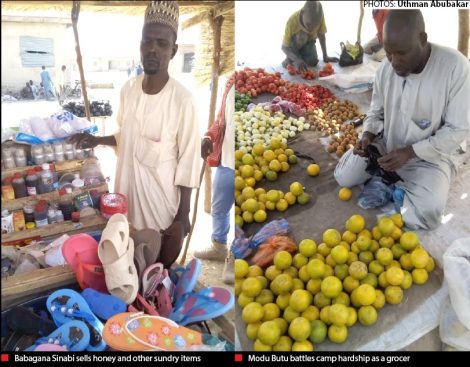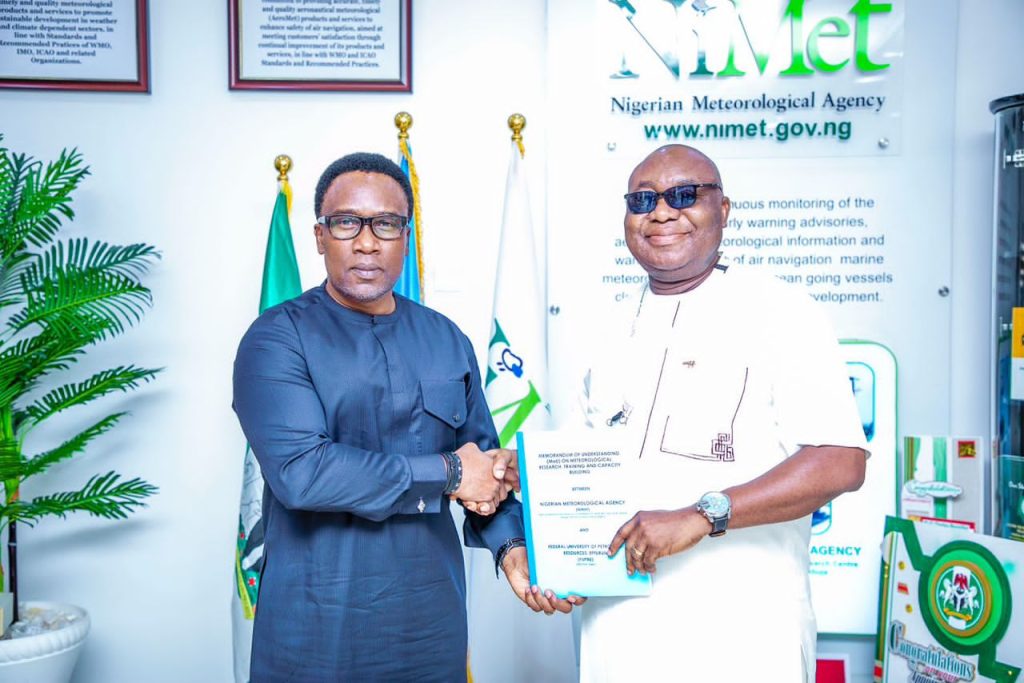Dwindling supply of relief materials has plunged people displaced by the Boko Haram insurgency in more hardships, necessitating their engagement in various trades to survive.
Forty-nine year-old Modu Butu and his family are from Monguno in Monguno Local Government Area of Borno State. They escaped Boko Haram attacks to live at an Internally Displaced Persons’ camp in Maiduguri.
In 2015, he used to receive a 50kg bag of rice, maize and beans as well as one 10 litre gallon of cooking oil, apart from food seasonings and other condiments to feed his family.
The story is no longer the came in 2019, as he now receives just a few measures of only rice and beans. It fluctuates between five and 10 measures, often without any cooking oil and condiments until the next supplies are due.
They have been at the Bakassi IDP Camp in Maiduguri since late 2014 when Boko Haram sacked many communities in the state. Modu and his family struggle with thousands of other IDPs who get pathetic care from stakeholders in the humanitarian crisis. Between 2014 and early 2017, federal and state governments, global agencies, international NGOs and numerous other stakeholders in Nigeria’s Northeast showed astounding commitment to soothing the pains of the IDPs from the trauma of the monumental loss of relations and property, and displacement from their native homes.
These stakeholders at that time maintained constant flow of relief materials which comprised among others, international-standard packages of food items, beddings and medicine.
The IDPs then seemed pampered within the context of their distress situations, as the stakeholders aimed to rescue them from the horrible situations the insurgency had plunged them into.
Due to numerous policy changes, emerging realities and the alleged misconduct of some IDPs themselves, supplies have fallen to a pathetic low level with the IDPs who used to receive bags of food items, now receiving only a few measures.
This situation has plunged them into additional hardships, as they seem to face the reality of relying on their individual efforts to survive.
Most of them collecting a paltry startup capital partly from the conditional cash transfer of the livelihood support programme, a government policy and partly from their various individual sources, now engage in various trades to make ends meet.
“I am now a grocer,” Modu told Daily Trust, “circumstances of camp survival necessitated me to engage in the trade. The relief materials I used to receive from SEMA (Borno State Emergency Management Agency) two to three years ago included bags of rice, maize and beans, maggi, two sachets of salt and one 20 litre gallon of oil for a month.
“Now, most of the times I only receive a few measures of rice and beans only without other grains, sometimes for two months, sometimes until God knows when to feed my family of 13 members.
“On rare occasions NEMA gives me one 25kg bag of rice and25 kg bag of beans, maggi seasoning, five litres of cooking oil, tomato paste sachets, but most times the relief materials I receive are inadequate to cater for the family for a week.
“This is why I sell oranges, cucumbers, carrots, garden eggs and salad to cater for my family. If it were not for the trade I would not be able to cater for the health needs of the family because the camp clinic can only give you analgesics, even if there are other drugs you need, you are only often told to go and buy them outside.
“Because of our squalid condition most of us suffer from diarrhea during the rainy season before government and some NGOs come to our aid.
“But we need some help because we need to buy firewood for cooking, soap for bathing and washing.”
Babagana Sinabi, 50, and his family of two wives and eight children from Kukawa Local Government Area, are also four years old at the Bakassi Camp.
“SEMA used to employ people to cook for us at the camp, later, it resorted to giving us the food items to cook by ourselves, we used to receive 25kg bag of rice, beans and maize for a month, but now we receive only a small bag of rice, a bag of semovita and a small jar of cooking oil which can last only about 10 days.
“After realising the necessity to engage in some trade to prevent my family from hunger, I found it convenient to sell honey, sandals, perfume and other items, but I must tell you that life at the camp is tough, many IDPs find it difficult to feed even once daily,” he said.
Danjuma Yusuf, 65, and his two wives and nine children from Kukawa Local Government Area are one month old at the camp. They are among the thousands recently sacked from the communities between Monguno and Baga by Boko Haram.
“Since we arrived at the camp with my family I haven’t received any food item. I immediately stood up to the stark reality of engaging in some trade to ensure the survival of my family, that is why you now see me selling suya and raw meat because my friends here warned me against relying on relief supplies from government and NGOs. I have been warned that relying on relief materials will compound my trauma as the head of a family.
Hadiza Abubakar, 28, a mother of two from Monguno Local Government Area, has been at the camp since 2014. She lost her husband and majority of relations to the bullets of the insurgents.
“When we arrived at the camp they used to cook food for us, then NEMA was giving us 25 kg bag of rice and maize, palm oil, one bottle for each person,” she recalled.
“Now, it’s seven measures of rice and beans and one bottle of cooking oil in a month, I am left to myself to provide for other things and healthcare for my children, it has not been easy for me and the children.
“That is why when I observed that most IDPs have to buy food items, I thought of selling rice at the camp because I make sales everyday,” she said, adding, “without this trade, life would have been unbearable for me and the children.”
Amidst reduced funds by international donors through the United Nations and the efforts of PCNI through NEMA and SEMA, supply of relief items to the IDPs has actually dwindled.

 News5 years ago
News5 years ago
 News5 years ago
News5 years ago
 News5 years ago
News5 years ago
 News5 years ago
News5 years ago
 Politics5 years ago
Politics5 years ago
 Politics5 years ago
Politics5 years ago
 Politics5 years ago
Politics5 years ago









